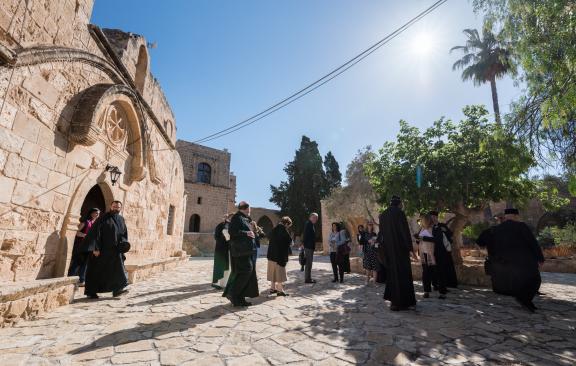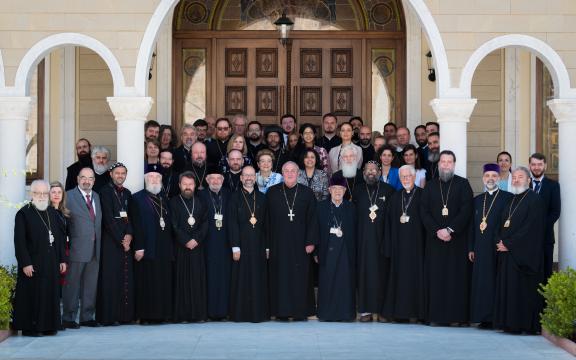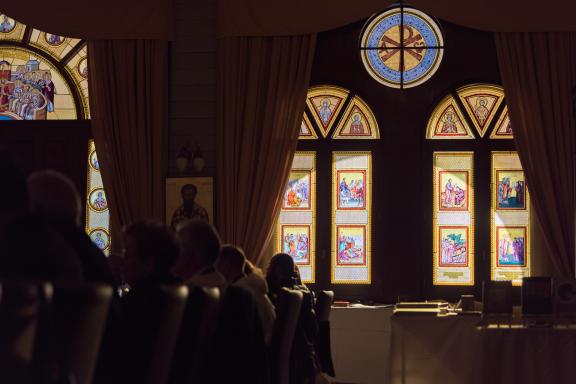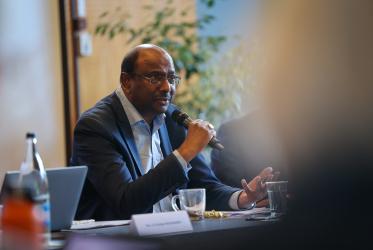With the World Council of Churches (WCC) 11th Assembly less than four months away, the Church of Cyprus serves as host as the WCC brings Orthodox churches together for an Inter-Orthodox Pre-Assembly Consultation on 9-16 May.
In a world facing grave challenges, of war, injustices and division, coming together to pray, reflect and work together is no small thing.

Participants at the Inter-Orthodox Pre-Assembly Consultation gather for morning prayer in the Monastery of Agia Napa on 10 May.
For His Eminence Metropolitan Dr Vasilios of Constantia and Ammochostos of the Church of Cyprus, offering hospitality in hosting the meeting holds special significance.
Representing a church that has been member of the WCC since the foundation of the council in 1948, Metropolitan Vasilios says his church “was always involved in the ecumenical movement since the beginning and part of the creation of the WCC.”
“The WCC has offered many times the possibility for the Orthodox churches – when we are isolated from each other – to come together to meet and to speak among each other as Orthodox, and this is a very helpful for keeping the koinonia among the Orthodox, especially in this period,” Metropolitan Vasilios explains, looking back at a recent period of several years during which the Orthodox churches have not been able to meet and dialogue in a similar constellation.

Participants at the Inter-Orthodox Pre-Assembly Consultation exit after morning prayer at the Monastery of Agia Napa on 10 May.
As a fellowship, the WCC holds a unique role in creating spaces for dialogue between Eastern and Oriental Orthodox churches which, although different, in the WCC context are brought together as one family.
A total of 52 delegates representing 20 Eastern and Oriental Orthodox WCC member churches are participating in the gathering.

Participants gathered at the Church of Cyprus diocese in Paralimni on 11 May.
Seeing contexts of suffering among people around the globe today, and the historical role of the churches in sustaining dialogue and working together for justice and peace, WCC acting general secretary Rev. Prof. Dr Ioan Sauca opened the meeting on 10 May stressing the focus of praying, studying, and discussing together, including “around current global challenges and how the Orthodox agenda at the WCC 11th Assembly can keep dialogue open.”

Session underway at the Inter-Orthodox Pre-Assembly in Cyprus on 10 May.
In preparing for the assembly, consultation participants have the opportunity to share and reflect together on specific issues affecting the churches and their communities, not least related to the significance of the assembly theme “Christ’s love moves the world to reconciliation and unity” from an Orthodox perspective – a theme that is studied at the meeting through lenses such as those of reconciliation; unity; solidarity, hospitality and peace; affirming the wholeness of life; human dignity, and our common humanity.
The group convened in Cyprus also discusses current realities and challenges around the world, including the war in Ukraine, Nagorno-Karabakh/Artsakh, conflicts in the Middle East, and Africa.

Participants from different backgrounds, traditions and parts of the world participate in the meeting. Here, Archbishop Abune Hiryakos of the Ethiopian Orthodox Tewahedo Church attending a moment of prayer.
Meeting in particular in the context of Cyprus – a country itself facing realities of occupation – serves as one reminder and example of the fragility of peace and the vital role of churches in working to achieve peace with justice.
“The Church of Cyprus goes back to the Apostolic time, so we have this long Christian tradition,” Metropolitan Vasilios explains.
Hearing participants reflect on the increasing challenge of many European countries seeing secularization leading to religious illiteracy among many people, Metropolitan Vasilios observes that Cyprus on the contrary is among the most religious countries.
“The history of Cyprus, and the role played by the church for keeping the Christianity is very important, and the people are conscious about the role of the church, because we had always someone occupying Cyprus. So the people know that the church has a very important role not only for religion but also for the survival of the Christian population of Cyprus,” the Metropolitan says.

H.E. Metropolitan Dr Vasilios of Constantia and Ammochostos of the Church of Cyprus speaks after morning prayer at the Monastery of Agia Napa, sharing some of the rich history and witness of the Church of Cyprus, historically as well as in the present day.
Before concluding on 16 May, the week-long meeting will also see participants observe the feast of Saint Epiphanius on 12 May, alongside visits to sites of historical significance in the life and work of the church in Cyprus, in addition to the preparations for the WCC 11th Assembly.

Work continues as the sun sets outside the Church of Cyprus diocese compound in Paralimni.
A final communiqué is being planned for release at the conclusion of the consultation on 16 May.
Orthodox churches pray and reflect on reconciliation as WCC 11th Assembly approaches (WCC press release of 10 May 2022)
Photo gallery: Inter-Orthodox pre-assembly consultation - 2022
Learn more: WCC 11th Assembly
Assembly theme resource: A reflection on the theme of the 11th Assembly of the WCC, Karlsruhe 2022
Report: “Pilgrims on the Path of Peace – The Journey of the WCC from Busan to Karlsruhe”







